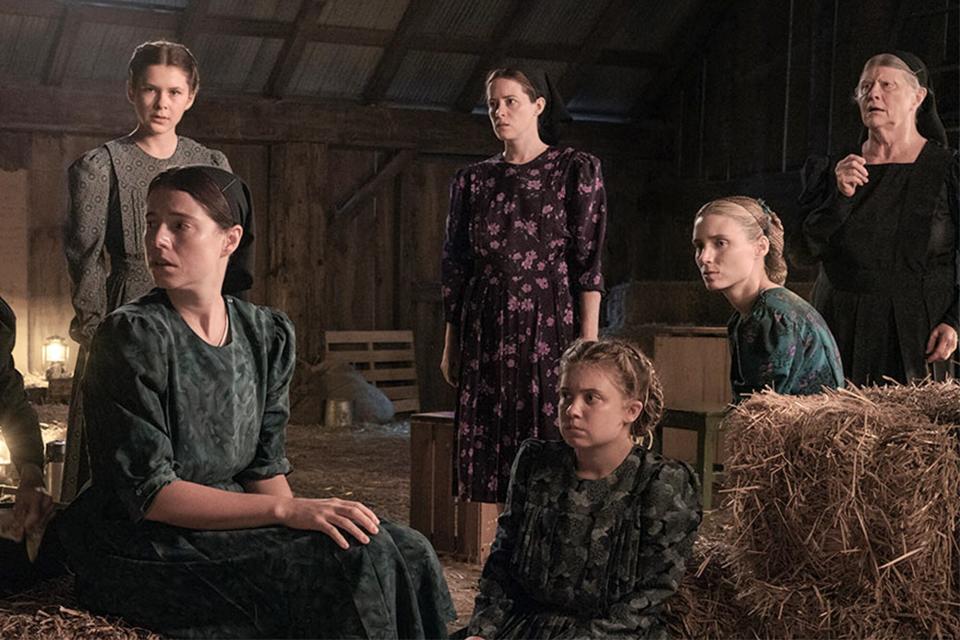Women Talking review: A religious commune reckons with rape and retribution
- Oops!Something went wrong.Please try again later.
- Oops!Something went wrong.Please try again later.
- Oops!Something went wrong.Please try again later.
The women in Women Talking talk to each other because it's one of the few things they're allowed to do. Reading and writing have been strictly forbidden; they've never even seen a full map of the world. Though writer-director Sarah Polley's austere drama, which premiered last night at the Telluride Film Festival, never specifies exactly which patriarchal faith they follow or where they live, her screenplay is based on Miriam Toews' bestselling 2018 novel of the same name, a story inspired by real events and set in a remote Mennonite colony in Bolivia shattered by a series of violent sexual assaults. Little girls and grandmothers alike wake up in their beds with dark bruises between their thighs and blood in their mouths; what they've just learned in the first scenes is that it's not the work of ghosts or demons, as they've been made to believe, but their own sons and brothers and husbands using animal tranquilizers to render them unconscious.
The only righteous path, these same men tell them once the truth is out, is to forgive, or risk eternal exile from the kingdom of heaven. But what is forgiveness if it's not freely given? Over the next two hours, the film follows eight of these women as they gather in a barn to deliberate — among them gentle, introspective Ona (Rooney Mara), whose own rape has left her pregnant; furious Salome (Claire Foy), who wants to stay and fight; Mariche (Jessie Buckley), who insists with equal ferocity that they submit to God's will; two even-tempered elders (Judith Ivey and Sheila McCarthy); and a pair of adolescent girls (Kate Hallet and Liv McNeil) too young to filter themselves about any of it. To record their thoughts and keep the minutes, they've enlisted a sympathetic schoolteacher (he only instructs the boys, naturally), a recent returnee to the colony named August (Ben Whishaw) who serves as a witness, a sounding board, and sometimes a punching bag as they vent and parry amongst themselves. In the novel, August is also the narrator, a fact that sat poorly with many readers; here that voice has been replaced by the occasional plucky interjections of a nameless girl, and Whishaw's August is such a tender puppy that he often sheds more tears than anyone. He's also wildly, hopelessly in love with Ona.

Michael Gibson/United Artists Releasing The cast of 'Women Talking,' including Jessie Buckley (left center), Claire Foy (top center), and Rooney Mara (right center)
The Canadian-born Polley, who worked steadily for years as a child actor (The Adventures of Baron Munchausen, Avonlea), has become a singular filmmaker and wellspring of female-centered narratives like the remarkable 2012 meta-documentary Stories We Tell and 2006's dementia drama Away from Her, which earned Julie Christie an Oscar nomination for Best Actress (and a Best Adapted Screenplay nod for its creator). That probably has a lot to do with why she landed such a high-profile cast, and why Frances McDormand, who also plays a small supporting role, came on board as a producer. It's a testament to the fierce talent of those actresses that the film works as well as it does; despite the expansiveness of its dreamy pastoral setting — green fields and hay bales, milky-white sunlight — the atmosphere often echoes the stagier tempos of a play or a chamber piece. The women in their calico dresses and kerchiefs discuss their collective fate and, more obliquely, the savage attacks on their bodies in ways that can seem oddly bloodless, as if it were all some Socratic Method test in a college debate class (though the brief, wordless flashbacks to the immediate aftermath of the attacks are brutally effective).
The rhythms of the dialogue, too, are sometimes stilted and strange — would a girl who can't even sign her own name really throw off the word "frenetic" so casually? — and the movie itself so rigorously self-contained and, well, talky that it's hard to imagine exactly who its wider audience will be. Still, there's a deep vein of humor and humanity that Polley and her actors mine from the text, and something quietly mesmerizing in their world-building. (If Foy or Buckley don't get at least one major industry nod, the awards system isn't working.) Women is billed in the title card, tellingly, as "An act of female imagination." When it lifts away from its more formal constraints, imagination almost feels like too soft a word for this fierce, sometimes inscrutable film; it's an act of will. Grade: B
Related content:

